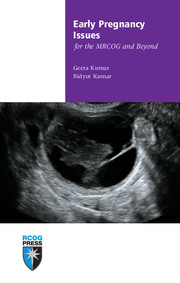Book contents
- Frontmatter
- Contents
- Dedication and acknowledgement
- About the authors
- Abbreviations
- Preface
- 1 Embryogenesis and physiology
- 2 Miscarriage
- 3 Recurrent miscarriage
- 4 Ectopic pregnancy
- 5 Trophoblastic disease
- 6 Hyperemesis gravidarum
- 7 Abdominal and pelvic pain in early pregnancy
- 8 Prescribing issues
- 9 Ultrasound and screening
- Further reading
- Index
- Published titles in the MRCOG and Beyond series
3 - Recurrent miscarriage
Published online by Cambridge University Press: 05 July 2014
- Frontmatter
- Contents
- Dedication and acknowledgement
- About the authors
- Abbreviations
- Preface
- 1 Embryogenesis and physiology
- 2 Miscarriage
- 3 Recurrent miscarriage
- 4 Ectopic pregnancy
- 5 Trophoblastic disease
- 6 Hyperemesis gravidarum
- 7 Abdominal and pelvic pain in early pregnancy
- 8 Prescribing issues
- 9 Ultrasound and screening
- Further reading
- Index
- Published titles in the MRCOG and Beyond series
Summary
Recurrent miscarriage is defined as loss of three or more consecutive pregnancies. It affects 1% of all women. This incidence is greater than that expected by chance alone as, based on a 10–15% risk of spontaneous miscarriage among clinically recognised pregnancies, this would be expected to be around 0.34%. So it is understandable that only a small proportion of women will be found to have an underlying aetiology identified as the cause for recurrent miscarriage. Recurrent miscarriage could be further labelled as ‘primary recurrent miscarriage’, where women have had no successful pregnancies, or as secondary recurrent miscarriage, where women miscarry repetitively after a successful pregnancy or pregnancies.
Aetiology
UNKNOWN OR IDIOPATHIC
Almost 50% of all recurrent miscarriages remain unexplained despite investigations. Most women who have two or three miscarriages have nothing wrong with them and this is the justification for not undertaking tests and investigations routinely before three consecutive miscarriages. Any drug treatment in this group would be empirical and the mainstay of management of these women is based upon emotional support supplemented by ultrasound scan in early pregnancy, which gives success rates of between 70% and 80%.
- Type
- Chapter
- Information
- Early Pregnancy Issues for the MRCOG and Beyond , pp. 32 - 41Publisher: Cambridge University PressPrint publication year: 2011

